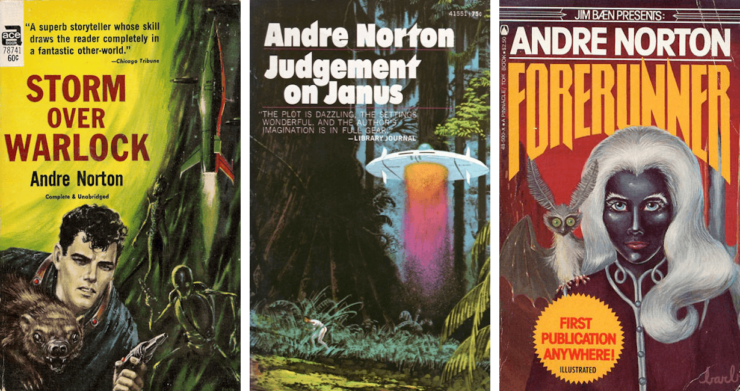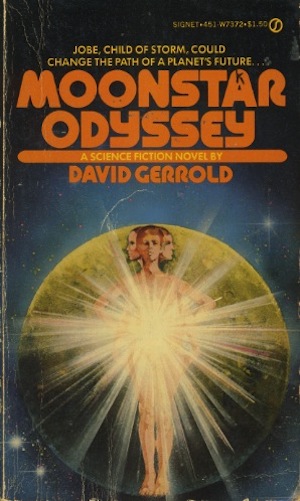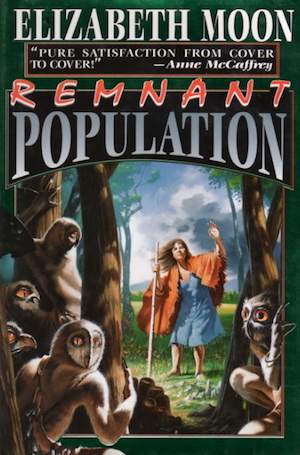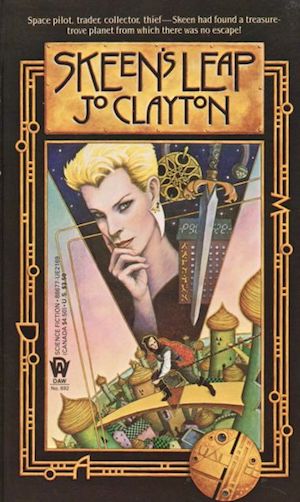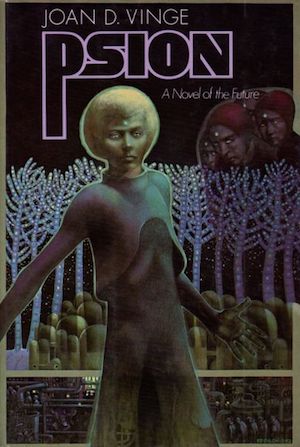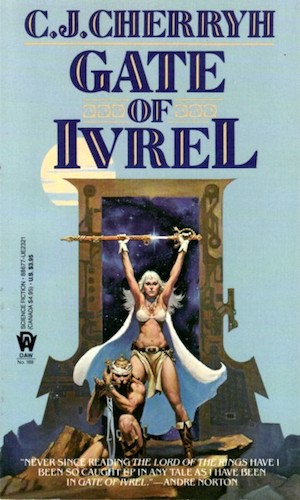What other authors wrote books with thematic similarities to the books of Andre Norton? Too bad that no one has ever asked me that question. Let’s pretend that someone has asked. Here are five suggestions.
David Gerrold might be surprised to find himself on this list, and even more surprised to see which book in particular comes to mind as Nortonesque. Moonstar Odyssey (the first and as far as I know only book in the Jobe sequence) is set on Satlik, a terraformed planet orbiting an atypical star. The same superb biotech that has guided the terraforming has also allowed the humans of Satlik to change themselves as they please. They can choose their gender; it’s usual to do this when adolescent. An unfortunate few are physically unable to do so. They are treated as pariahs. (Genetic engineering or no genetic engineering, humans can be jerks and they love having people to bully.) Jobe is one such pariah. They finds themselves on an epic and unpleasant journey that reminds me of several Norton protagonists. Like them, Jobe finds themself in the wrong place at the wrong time.
Elizabeth Moon’s Remnant Population reminds me of Norton’s Judgment on Janus. Like Janus, Remnant features a needlessly hierarchical social arrangement that would seem familiar to any of Norton’s street kids and outcasts. When a failed colony is closed down, elderly protagonist Ofelia opts to remain behind. Better to spend her few remaining years alone but free than to be to dragged off to the next badly planned colony. It turns out that while Ofelia may be (for the moment) the only human on the planet, she is in no sense alone. Just like the protagonist in Janus, Ofelia will have to reach an accommodation with natives of whose presence she had hitherto been unaware.
There are some authors who seem to have been directly influenced by Norton. Jo Clayton’s oeuvre could be seen (from one angle) as a long-running experiment in crafting Nortonesque stories with better writing and lots of sex, Perhaps the most Nortonesque Clayton is the Skeen sequence, which begins with Skeen’s Leap. Skeen, a down-on-her-luck adventurer trapped on Kildun Alpha, faces arrest if she does not find a way off the planet. Huzzah for ancient, inter-dimensional gates leading to who knows where?!!!
Skeen’s habit of jumping into things without asking questions does not always work in her favour—after she leaps through a one-way gate, she accepts an ill-advised contract—but readers will be entertained by the consequences of Skeen’s lack of prudence as well as by her snarky voice.
Joan D. Vinge’s Psion is also unabashedly Nortonesque, the tale of half-alien, half-human Cat, a street kid with special powers. He’s trying to survive a system designed to exploit people like Cat. Cat’s psionics earn him an involuntary slot in Seibeling’s psion-training program (think how the X-Men would play out if Charles Xavier were a kapo). Cat is expected to become a draftee in a war against rogue psions (that is, psions who don’t want to be rich men’s slaves). But in the end, he’s dispatched to another disagreeable post—on Cinder, a remote mining world which has natives who disapprove of off-worlders strip-mining their planet. If you were looking for something like the Forerunner series with better prose, consider Psion.
Norton’s Forerunners, by way of an online discussion, led me to the book that inspired this little piece. I realized that the qhal, the enigmatic beings responsible for creating reality-violating gates in C. J. Cherryh’s Morgaine series, are Forerunners under another name. Norton’s fiction was replete with poorly documented inter-dimensional gates offering escape and adventure . Adventure, because you didn’t know where you might end up, or which vicious armies might decide to invade through such gates.
Cherryh’s Gate of Ivrel adds a twist Norton might have liked (Note: initially, I wasn’t sure if she had ever read Cherryh, until the blurb on the book cover made it clear that she had—it’s safe to say that Norton did enjoy the first of the Morgaine books, at the very least). The same gates that can bridge space and time can break it. Morgaine’s grand quest is to shut the gates down before this happens again. By the time Vanye meets Morgaine, Morgaine has been pursuing this quest for centuries. If Vanye joins the quest, he will have to abandon her world forever. It’s a good thing that Vanye is (like so many Norton characters) an outcast in desperate need of an exit….
I’ve read lots of SFF books, but I haven’t read them all. Nor can I remember them all. If you can think of Nortonesque novels I have overlooked, please mention them in comments.
In the words of Wikipedia editor TexasAndroid, prolific book reviewer and perennial Darwin Award nominee James Davis Nicoll is of “questionable notability.” His work has appeared in Publishers Weekly and Romantic Times as well as on his own websites, James Nicoll Reviews and Young People Read Old SFF (where he is assisted by editor Karen Lofstrom and web person Adrienne L. Travis). He is a finalist for the 2019 Best Fan Writer Hugo Award, and is surprisingly flammable.










